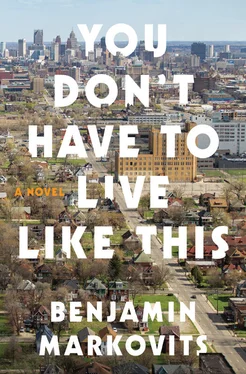He had passionate political feelings but also liked to chase women and get drunk. Sometimes he used his political earnestness to chat up girls — this was the sort of thing I used to dislike him for. He missed doing “fun drugs,” stuff like mushrooms, marijuana, ecstasy and cocaine. We talked about all that in the car. In a couple of years if he wanted to get serious about politics, he was going to have to marry some nice girl. But not yet. You have no idea, he said to me, what a turn-on it is, political power. I can get girls these days who I couldn’t even kiss without standing on a step. (He’s about five foot seven, a pink-faced, clean-shaven guy who still looks like the boy next door.) The girls get turned on, aides, interns, secretaries (never his own), he gets turned on, everybody gets turned on together, by his access to committee meetings and the governor’s cell phone number.
“I don’t know why I’m telling you all this,” he said. “I’ll tell you something else. There’s a story that Matt Damon’s coming tonight.”
“What do you mean, a story?”
“Maybe Beatrice told me, I can’t remember. My sister knows his agent and Matt’s in Detroit filming. I got my eye on him.”
“For what?”
“To play me in a movie, what do you think. When I’m president.”
After all this, the house, when we finally pulled up the drive, turned out to be sweeter, smaller and quainter than I imagined. Mud-gray shingles and crooked chimneys, with a screen porch at the back. A couple of loose steps pointed down the garden path to the beach. His great-grandfather built it in 1913 when his shares in Ford Motor took off. He was one of the first people to pick this particular spot along the shoreline of Lake St. Clair. But the garden was large and beautifully, wildly kept, with rose hips and blackberry bushes, plum trees and tulips leading down to sandy grass. There was also a short rotting dock and a speedboat in the water.
Inside it was bigger than it looked, with lots of small bedrooms sharing bathrooms and corridors. From the bed my room had a view of the water, and I lay down and took a nap while people tramped around downstairs. I could hear men in the garden hammering in the stakes for the marquee. When I woke up it was maybe four o’clock, a very clear lakeside windy afternoon. I put on a jacket and tie and went out the back into the garden, where somebody in black tails handed me a champagne cocktail. There were maybe thirty people standing around; the women had to hold on to their hats.
The first person I recognized was Michael Carnesecca, Tony’s kid. He hugged me around the knees and made me spill my drink. I like this kid; Cris let me give him a sip of what was left in the glass. He made a face and said “More,” and then we played chase with the glass for a while — he jumped up and I held it out of his reach. He was a little violent; it got out of hand. At the same time I was looking around at the other guests, looking for Matt Damon, and Cris, misunderstanding me, said, “Go ahead, Marny, go find some pretty girl.” But she had to pull him off me in the end, by force, and took him aside into the bushes to bawl him out — in undertones. It was the first time I saw her lose her temper.
So I refilled my glass at one of the white-clothed tables and ended up standing next to a woman with flowers, real flowers in her hat. Roses and petunias, I don’t know. She was a ripe-colored black woman, almost eggplant-colored. Her lips were painted some glossy shade that made them look freshly licked. In her summer dress she stood the way a man stands in jeans — I could see her plump strong legs under the material. She was short, too, and looked about fifteen years old.
It was difficult to hear so we walked down towards the water, towards the sandy grass. The band was starting to set up by the back porch. Her name was Gloria Lambert and she taught art and computers at Kettridge High School — about five minutes by car from Johanna Street. In fact, she knew Johanna Street well. A good friend of hers lived on Johanna Street, and I started to laugh.
“I guess you met Nolan,” she said.
“Yeah, I met him.”
“His bark is worse than his bite.”
“That doesn’t mean he don’t bite,” I said, though why I said don’t I don’t know. “Is he a boyfriend of yours?”
“You ask questions. How many you think I got?”
“So how come you know him?”
“There’s a program I run where local artists come in to talk to the kids.”
“Is that what he is? So why did you get invited to this thing?”
“I won the Eliza Curtis Hubbard Memorial Award.”
“Which is for what?”
“Teaching art. Let me ask you a question. This is what I don’t understand. Those are some nice houses on Johanna Street, but what are you going to do when you get there?”
“I don’t know. I’m drifting a bit right now.”
“Well, what are you good for?” she said.
In the windy sunshine, everything looked very beautiful and real. Maybe I fell a little in love. I said to her, “You’ve got the most amazing skin I’ve ever seen on a human being. Do people say that to you?”
“White men. Usually they put it a little different.”
I had just drunk two champagne cocktails on an empty stomach. There was a flagpole in the garden, about twenty feet high and made of painted wood. The paint was peeling but the Stars and Stripes hung out straight in the wind and sometimes dipped suddenly and folded over itself. That’s how I felt all afternoon, coming and going.
Then someone said, “George,” and pulled at my elbow. It was the German girl, Astrid, the hitchhiker, with a camera in her hand. She took my picture with Gloria, who afterwards moved away.
“How did you get here?”
“Your friend Robert likes blondes. Don’t you remember, you sent me his email address?”
“What happened to Ernst?”
“He wanted to go, I wanted to stay.”
This is how the afternoon went on. If I wanted to get out of a conversation, I said, “Have you seen Matt Damon? He’s supposed to be here,” and pretended to look for him. A video guy pushed his way through the crowd, with his face hidden by the machine. Whenever I saw him I carefully finished my sentences. There were speeches, too. Robert James said a few words; the wind made rough kissing noises and squeaks against the microphone. Bill Russo talked. “This is the house my great-grandfather built with money put in his pocket by the men who worked the line at the old Ford Motor factory in Highland Park.” For maybe an hour, around six o’clock, I played quietly inside with some of the kids. Clay Greene had showed up with his two boys, and I met his wife, Helen, a very tall, handsome, likable, not at all graceful woman, who was trying to make macaroni and cheese. “There isn’t any butter,” she said. “Can you run to the shops to get butter?”
“There aren’t any shops here. I’m too drunk to drive. I don’t have a car.”
Beatrice came in, looking for something, and saw Helen. The two big, good-looking women embraced, leaning over each other.
“I need to get a few things from the shops,” Helen said. “Do you mind staying here with the boys? They’re perfectly happy. I’ll be back in a minute.”
Beatrice said, “No, that’s fine. Of course. Go.”
“Are you sure? I can’t face wrestling them into the car.”
“Go.”
So she went. One of the boys, the smaller one, started crying and going after his mother, so Beatrice with a certain rough familiarity picked him up in her arms. She was wearing a linen pants suit — working dress. The boy kicked and she dropped him and stood kind of flat-footed and unhappy while he cried.
“I’m no good with kids. These kids don’t like me.”
Читать дальше












